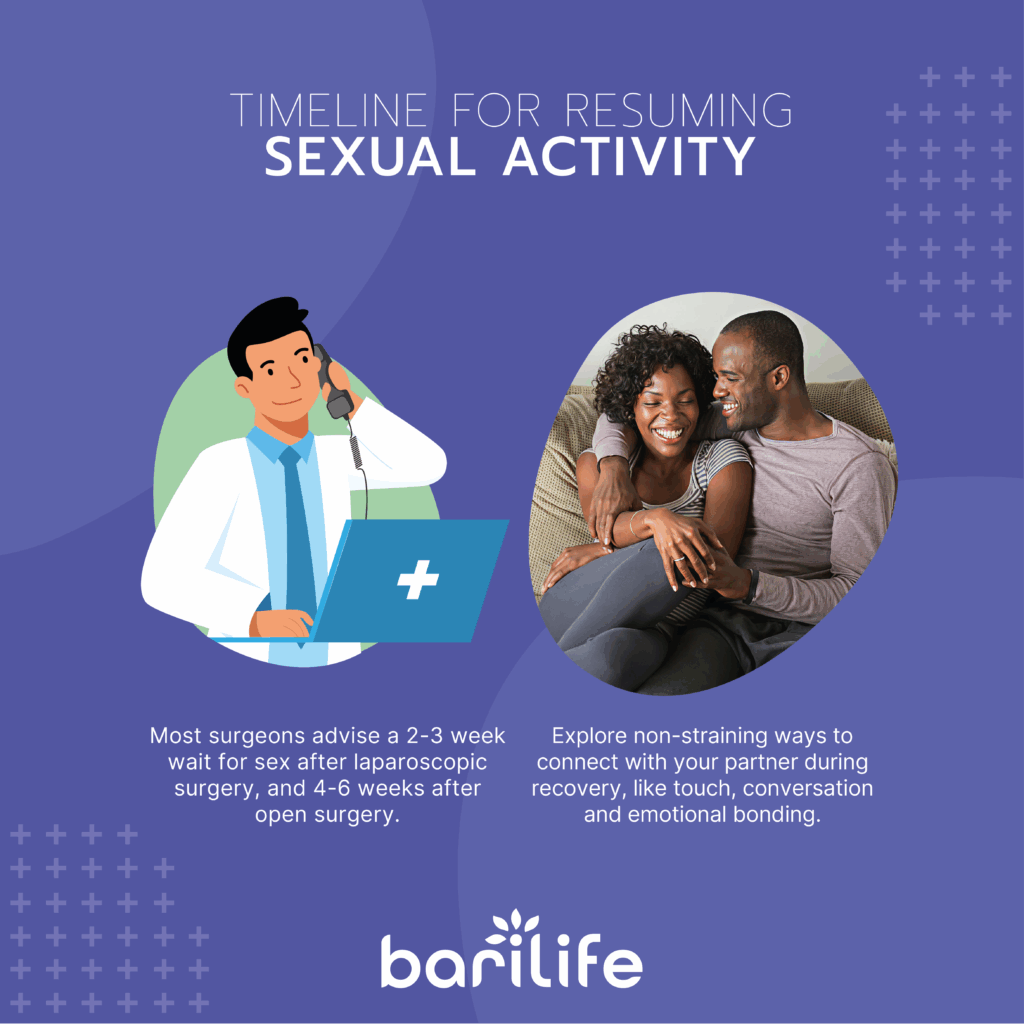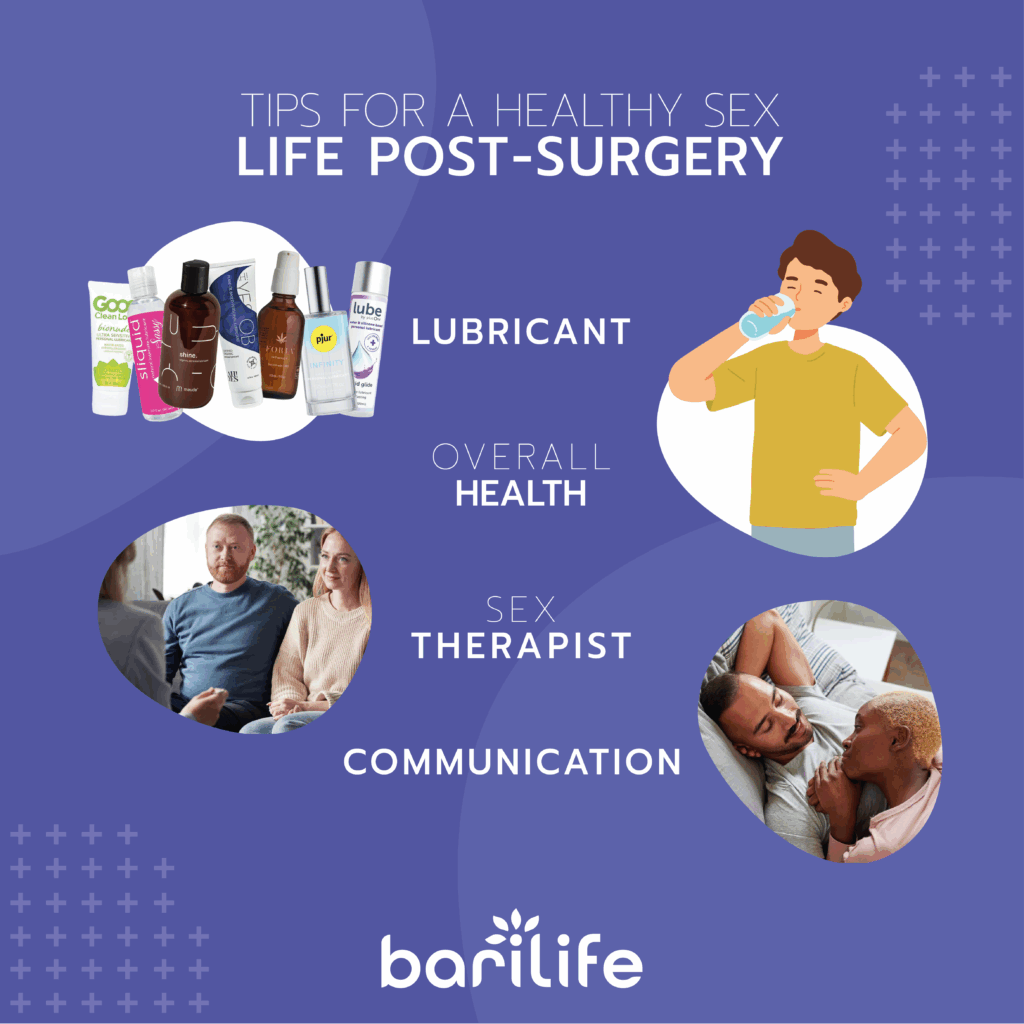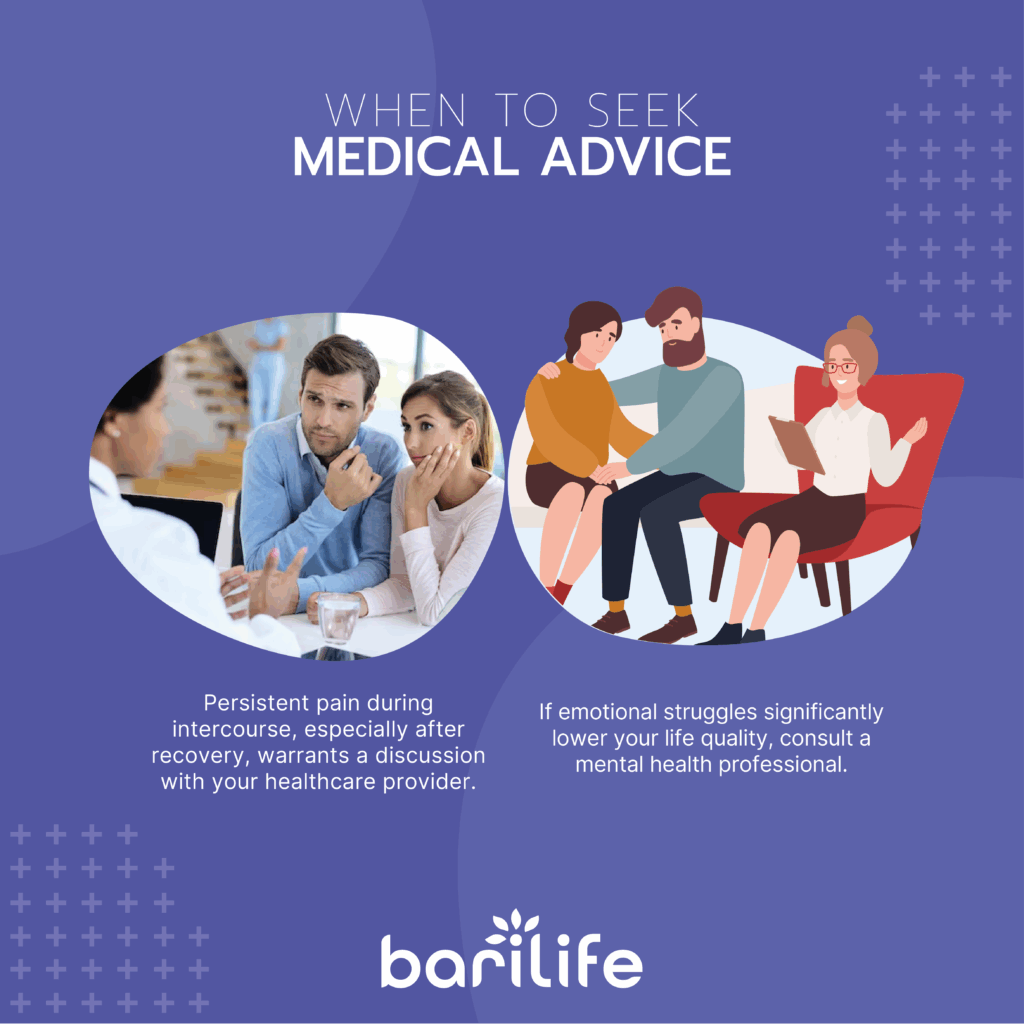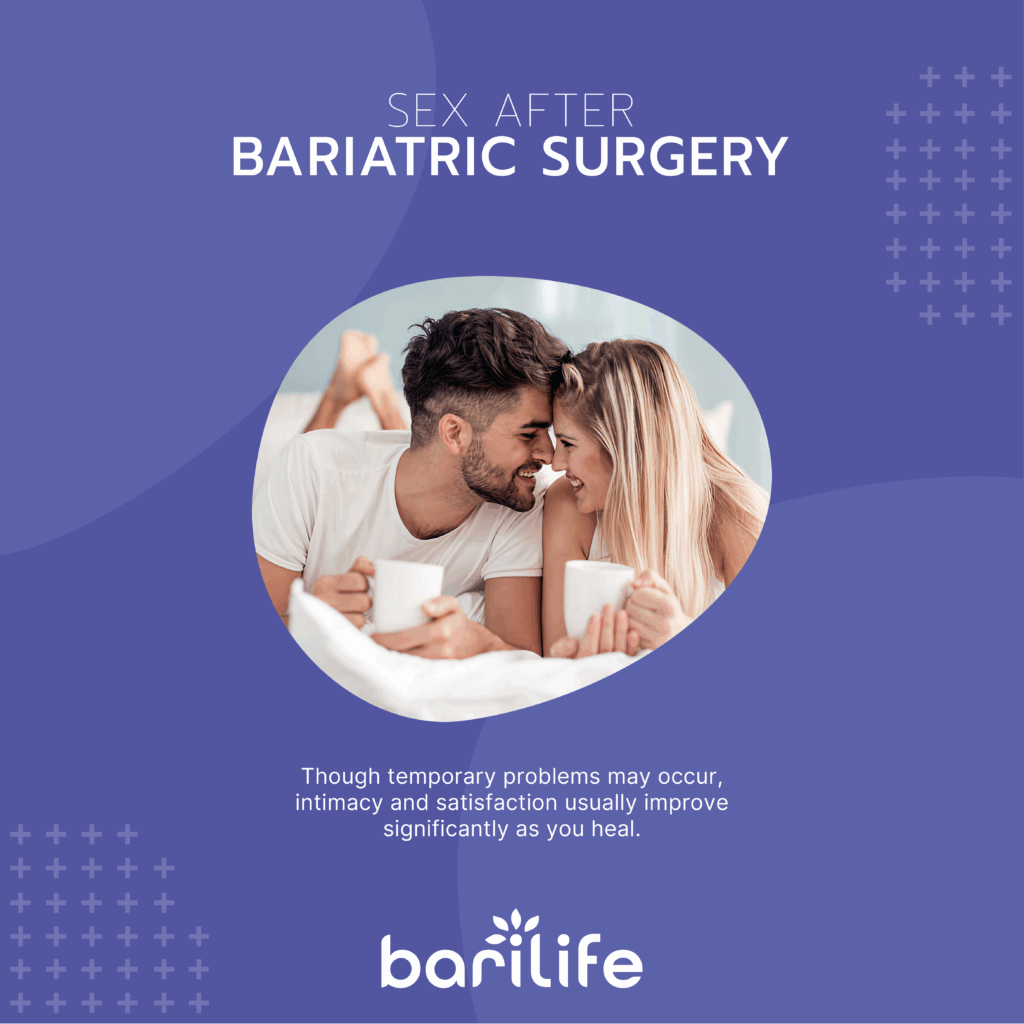Key Takeaways
- Most people can safely resume sex after bariatric surgery once they feel comfortable and pain-free.
- Weight loss after surgery often improves both physical function and emotional well-being related to intimacy.
- Honest communication with partners and healthcare providers is important for addressing any challenges that arise.
Sex after bariatric surgery is a common concern many individuals have, but might be too embarrassed to ask about. The good news is that for most people, sex after drastic weight loss eventually becomes more enjoyable than before. However, there are some important things to understand about the recovery process and how your changing body might affect your intimate relationships.
Read on to learn when you can resume sexual activity, physical changes that affect sex, psychological and emotional factors, and more.
Table of Contents
Timeline for Resuming Sexual Activity

The time when you can safely resume having sex after bariatric surgery varies from person to person. Some people feel ready within a week after their procedure, while others might need several weeks before they’re comfortable being intimate again.
The type of surgery you had makes a difference in your recovery timeline. If you had an open procedure (with a larger incision), you’ll likely need more time to heal than if you had laparoscopic surgery (with smaller incisions).
Before jumping back into sexual activity, make sure that:
- You’re no longer experiencing significant pain
- You’re not taking strong pain medications
- Your doctor has cleared you for moderate physical activity
- You feel mentally and emotionally ready
If something doesn’t feel right or causes pain during intimacy, it’s best to wait a bit longer. Your body is going through significant changes, and giving yourself time to heal is important.
Many people wonder about specific timeframes, but there’s no one-size-fits-all answer. Generally speaking, most surgeons advise that you wait at least 2-3 weeks after laparoscopic procedures before resuming sexual activity. For open surgeries, the waiting period might be 4-6 weeks or longer.
Remember that intimacy doesn’t always have to involve intercourse. During your recovery, an essential part of life after bariatric surgery, you might explore other ways to maintain a connection with your partner through touch, conversation, and emotional bonding that doesn’t strain your healing body.
Physical Changes Impacting Sex Life
Many people experience positive physical changes that improve their sex life after bariatric surgery.
Hormone Changes
Hormone levels often change as you lose weight. For many, this means an increase in sex drive after bariatric surgery that had previously been suppressed. The changes in hormones can lead to better sexual satisfaction and more interest in intimacy. For women, these hormonal shifts might regulate menstrual cycles that were previously irregular, which can also impact sexual health and comfort.

Better Circulation
Blood flow throughout your body also improves with weight loss. This enhanced circulation can lead to better sexual function, including stronger arousal and more satisfying experiences. Both men and women typically notice improvements in physical response during intimate moments. Men often report better erectile function, while women may experience increased sensitivity and easier arousal.
Improved Activity Tolerance
Perhaps one of the biggest physical changes affecting sex life is improved mobility and stamina. With less weight to carry, you may be able to move freely and maintain activity for longer periods without becoming winded or uncomfortable. This can open up new possibilities that weren’t feasible before in your intimate life.
Better Joints
Joint pain often decreases after surgery, making physical activity more comfortable. This includes sexual activity, which can become less painful and more enjoyable when your joints aren’t under as much strain. Many people find they can maintain certain positions longer or try new positions that weren’t comfortable before weight loss.
Psychological and Emotional Factors
The relationship between weight loss and sexuality isn’t just physical—there’s a strong emotional component, too.
Many people experience a significant boost in self-confidence as they lose weight. This improved body image can make you feel more attractive and desirable, which often translates to more enjoyment during intimate moments. However, it’s also common to have mixed feelings about your changing body.
After dramatic weight loss, some people struggle with concerns about loose or excess skin. This can sometimes create new insecurities that affect how comfortable you feel being naked with a partner. Remember that these feelings are normal, and working through them takes time.
The rapid changes in your body can also trigger emotional ups and downs. You might feel excited and positive one day, then uncertain or even sad the next. These emotional fluctuations can affect your interest in sex and how you connect with your partner. Hormone changes during rapid weight loss can sometimes intensify these emotional shifts.

Open communication is especially important during this time. Communicating openly with your intimate partner about your feelings, concerns, and needs helps build understanding and patience. Many couples find that going through this journey together actually strengthens their relationship and deepens their intimacy.
Your changing appearance also affects how others respond to you. Receiving more attention from others can be flattering but might also feel strange or overwhelming. This shift in how the world perceives you can impact your self-image and sexual identity in complex ways that take time to process.
Potential Sexual Challenges
While many aspects of your sex life may improve after surgery, some challenges might arise that are worth being prepared for.
Physical Discomfort
Physical discomfort during sex can occur, especially in the early months after surgery. This might include tenderness around incision sites or discomfort with certain positions that put pressure on your abdomen. Finding positions that avoid strain on your healing body is important, much like finding the right approach to exercise after bariatric surgery, where gradual progress is key.
Increased Fertility
For women, increased fertility can be an unexpected side effect of weight loss after bariatric surgery. If you previously had difficulty conceiving due to weight-related factors, you might become more fertile as you lose weight.
Relationship Challenges
Changes in relationship dynamics sometimes occur after significant weight loss. Your partner may need to adjust to your new appearance, energy levels, and increased self-confidence. Some relationships thrive with these changes, while others may face challenges if partners have difficulty adapting to the “new you.”
Emotional barriers sometimes emerge or persist despite physical improvements. You might deal with:
- Anxiety about how your partner perceives your changing body
- Fear of rejection or judgment
- Lingering negative self-image despite weight loss
- Concerns about performance or expectations
Tips for a Healthy Sex Life Post-Surgery
There are several practical steps you can take to nurture a satisfying sex life after bariatric surgery.

Communication
Communication with your partner is even more important during this time of change. Share what feels good and what doesn’t. Discuss any concerns you have about intimacy. Be open about how your energy levels and comfort zones might be different than before surgery. Many people find that this level of honest communication deepens their connection.
Exploring New Ways
Exploring new ways to be intimate can keep your relationship fresh while accommodating your changing body. This might mean trying different, more comfortable positions, focusing more on touch and foreplay, or exploring new ways to express affection that don’t always involve sex.
Overall Health
Taking care of your overall health supports a good sex life, too. This includes:
- Staying hydrated
- Getting enough rest
- Following your post-surgery nutrition plan
- Being physically active in appropriate ways
- Managing stress through healthy outlets
Lubricants
Using appropriate lubricants can make sex more comfortable, especially if hormonal changes or nutritional factors have affected natural lubrication. Water-based lubricants are safe and effective for most individuals.
Scheduling Intimacy
Scheduling intimate time might sound unromantic, but it can be practical after surgery when your energy levels might fluctuate throughout the day. Planning for intimacy when you typically feel your best can lead to more satisfying experiences.
Sex Therapist
Consider talking with a sex therapist if you’re having persistent difficulties with your sex life after surgery. These professionals specialize in helping people navigate changes in sexual function and can offer practical solutions tailored to your specific situation.
When to Seek Medical Advice
While most changes to your sex life after bariatric surgery are manageable on your own or with your partner, some situations warrant professional help.

If you have persistent pain during sexual intercourse, especially beyond the initial recovery period, talk to your healthcare provider. This could indicate a complication or an issue that needs medical attention. Don’t just assume that discomfort is normal and something you have to live with.
Emotional struggles that significantly impact your quality of life should be addressed with a mental health professional. If you’re dealing with persistent depression, severe anxiety about intimacy, or debilitating body image issues, seeking help is important. These feelings can interfere not just with your sex life but with your overall happiness and recovery.
Any unusual physical symptoms during or after sex should prompt a call to your doctor. These might include:
- Unexpected bleeding
- Sharp or severe pain
- Problems with incision sites
- Symptoms of infection, like unusual discharge or fever
Don’t hesitate to bring up sexual concerns during your follow-up appointments. Your healthcare team wants you to have a full recovery in all aspects of life, including your sexual health. They can provide advice based on your specific situation and surgical details.
If you notice persistent issues with libido or sexual function that don’t improve as you recover, consider asking for hormone-level testing. Sometimes, hormonal imbalances that affect sexual health can be addressed with appropriate treatment.
Remember that your bariatric team is trained to address all aspects of your post-surgical life, including intimacy. They’ve heard these questions before and can provide resources or referrals to specialists if needed.
Conclusion
Sex after bariatric surgery is an important part of your overall recovery and return to a fulfilling life. While you may face some temporary challenges, most people find that their intimate relationships and sexual satisfaction improve significantly as they heal and adjust to their changing bodies.

Be patient with yourself as you navigate these changes, and don’t hesitate to seek support when needed. With good communication, proper care for your physical and emotional health, and realistic expectations, you can develop a healthy, satisfying sex life that complements the many other positive changes resulting from your weight loss journey.
How Bari Life Can Help
Your overall health and nutritional status can significantly affect your intimate life after bariatric surgery. Bari Life offers specialized supplements designed specifically to support your body’s unique needs during this transformative time, including a wide range of bariatric vitamins tailored for post-surgery recovery and vitality.
We understand the many changes your body is experiencing, and our products are created by bariatric specialists who recognize how proper nutrition supports every aspect of your post-surgery life—including sexual health and well-being. Our offerings include bariatric multivitamins, bariatric vitamins chewable, and even bariatric multivitamin with iron to help fill common nutritional gaps following surgery.
Maintaining optimal protein intake is also essential, which is why Bari Life provides delicious and effective bariatric protein shakes and bariatric protein bars that support muscle preservation and energy levels. For those looking for convenient and satisfying options between meals, we also offer a variety of bariatric snacks specifically formulated to meet your dietary needs.
Our complete product line extends to bone health with our tasty and effective bariatric calcium chews, as well as gut health with our carefully formulated bariatric probiotic to support digestion and nutrient absorption.
Hair thinning can be a concern after surgery, which is why we include bariatric vitamins for hair loss to help you maintain healthy hair as your body adapts. We also understand that different patients have different preferences, so we offer options like liquid bariatric vitamin formulas for those who have difficulty swallowing pills.
Take control of your complete health journey and support your intimate relationships by ensuring your body has the nutrition it needs. Visit Bari Life today to discover how our specialized supplements can help you feel your best in every way after bariatric surgery.
If you want to learn more, why not check out these articles below:
- Transfer Addiction After Bariatric Surgery
- PowerLifting After Bariatric Surgery
- How To Build Muscle After Bariatric Surgery?
- How To Sleep After Bariatric Surgery?
- Smoking After Bariatric Surgery
- Toning Exercises After Bariatric Surgery



What are your tips and tricks to post-bariatric success?